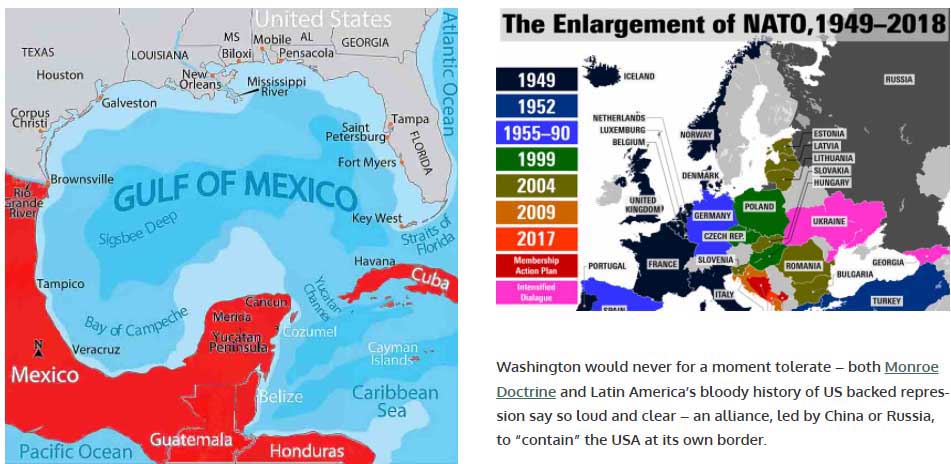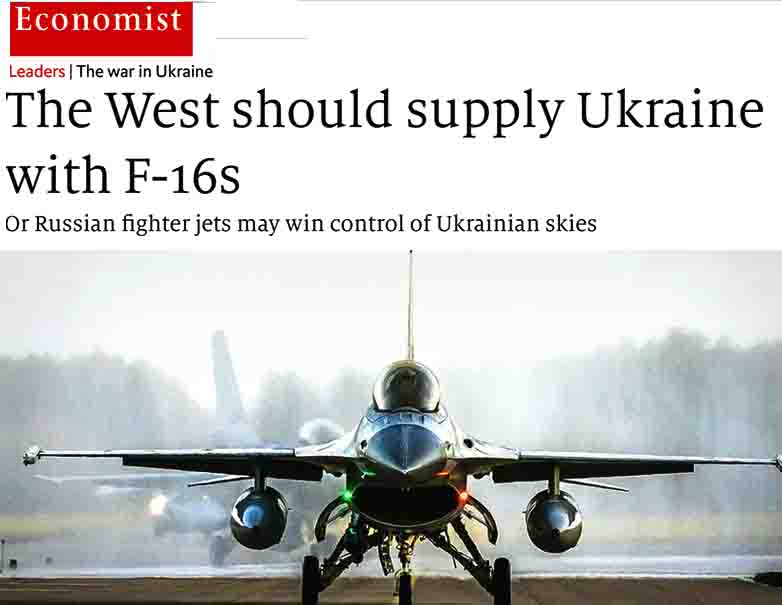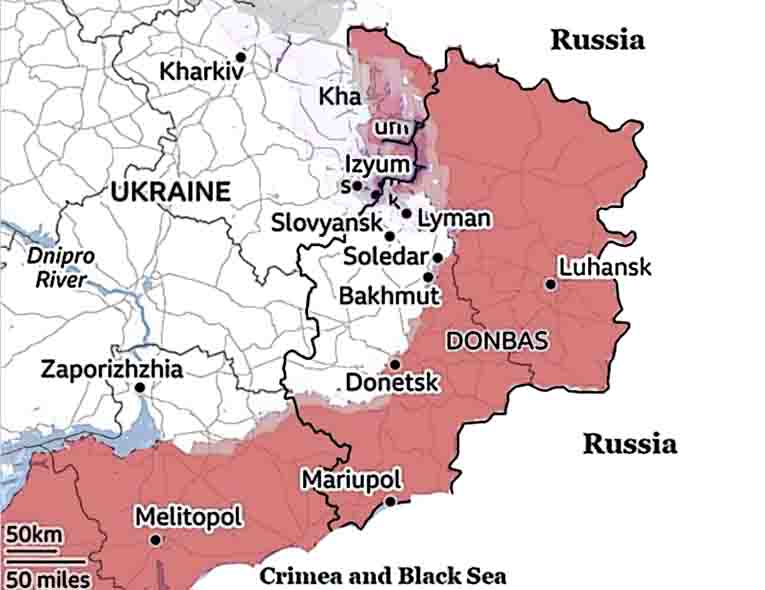LIE No.1 about Ukraine is that it is “Putin’s war”, consequence of his unprovoked aggression. I’ve set out in many posts the many reasons 1 for rejecting that inversion of culpability. Because it’s the simplest of those reasons, requiring the fewest words, I show this image a lot.

LIE No 2, just as widely believed in the West, revolutionary Left included, 2 is that Russia cannot win. It is now dawning on ‘our’ politicians and media – the latter’s ‘quality’ segments, as I’m forever saying, systemically incapable of being truthful on matters pivotal to class rule – that Russia may indeed be winning.
I used to take The Economist seriously – well, sort of – but it fell into self parody years ago with transparently propagandised predictions, of China’s imminent economic meltdown, reminiscent of Comical Ali’s TV appearances 20 years ago to report the US war machine being trounced by Iraqi forces. 3
The Economist has since February last year been reliably talking up Ukraine’s progress in the war. Again to the point of self parody. Now, alongside Guardian, NYT etc, it is softening up its readers – in the aftermath of the Pentagon’s leaked Ukraine war papers – for more sobering assessments. A sudden passion for truth? Or to weave a fig leaf of consent – with the usual “it is with heavy heart” trimmings – for pouring still more arms into a so far proxy war, to the soaring of Raytheon shares and fast-tracking of our date with Armageddon …

The Economist, April 26. But didn’t Russia win control of Ukrainian skies months ago?
… though it is now clear, if only to the attentive – never a large community I grant you, on those matters where corporate media’s job is to keep us asleep while dreaming we’re wide awake and well informed – that trillions may be spent without making a ha’porth of difference to arms supply chains stretched beyond their capacity to influence events on the ground in anything like the timescale the circs require.
A few days earlier, on Sunday, April 23, another Economist leader had this to say:
Hello from London,
Here’s what should be a safe prediction about relations between the West and Russia: they won’t be improving any time soon. The war in Ukraine has become one of miserable attrition. Reports of Russian conscripts in Bakhmut sent to be machine-gunned by the Ukrainian forces are horrifying—the sort of killing you’d associate with the first world war in Europe, not this century. Yes, a counter-offensive by Ukraine is coming, but don’t bet on the frontlines shifting dramatically. Meanwhile Vladimir Putin, the one man who could choose to call off his criminal war of aggression, is unmoved and unmoving. He’s presumably set to remain in office for a long time yet.
So. “Reports of Russian conscripts in Bakhmut … machine-gunned are horrifying …” Yet writer Adam Roberts – TE’s digital editor – doesn’t name these reports. Far less link to and give their provenance; no small omission when reports offered, implicitly or even explicitly, as impartial invariably turn out to be sourced by military intelligence and/or thinktanks funded by the West.
Until Mr Putin goes—and possibly beyond—the ties between the West and Russia will only worsen. Russia’s cruel repression of opposition figures, and now its assault on foreign journalists as well as local ones, all bode ill for that country. What leverage does the West have to put pressure on Mr Putin? Beyond supporting Ukraine more robustly, the main option is to tighten and prolong sanctions on Russia, in the hope that a weakened economy will be less able to support its armed forces. We have just published our latest, detailed, assessment of the impact of the sanctions— and the threat to Russia’s ability to fight. No spoilers here, but while sanctions do play a big role, don’t expect short-term change.
For more on Russia, I urge you to listen to all the episodes (the final one just dropped) of our podcast series, Next Year in Moscow. In it, my colleague Arkady Ostrovsky—our Russia editor—traces the prospects of those who dare to defy Mr Putin. It’s a captivating show.
After moving to other topics, Mr Roberts returns to Ukraine.
Finally … we’ve just published a story on the state of Ukraine’s airforce —which could play a big role in the coming counter-offensive. I strongly recommend it, not least for my colleague’s description of taking a spin in a fighter jet over the Baltic Sea. I don’t deny that I’m just a bit envious of that reporting trip.
An armchair warrior’s wet dream.
Thanks for your recent messages. I’ll just highlight one, this week. Mohammed Dori, from Ontario, Canada, calls us needlessly optimistic in hoping that Ukrainian forces will be able to push back Russian ones. He suggests we are wrong to be “rooting” for a Ukrainian victory, as “that prospect is receding”. I respectfully disagree, Mohammed. We don’t believe that pushing back the Russian forces will be straightforward. Indeed a slow, long, war of attrition is, sadly, the likelier outcome. But we’ll continue to root for Ukraine to succeed, and for allies to offer more military and economic support, because that remains the right thing to do.
I disrespectfully disagree with Adam Roberts, who is well paid to write as he does. And to not think too deeply – Upton Sinclair springs to mind 4 – nor turn too many of the wrong kinds of stone. But while being well paid to put out empire propaganda may confer influence over the credulati’s most deluded section of all – those who take ‘quality’ corporate media consumption to be a surefire route to erudition – digital editors aren’t the most astute assessors of military realities. Least of all when hacking for Washington and Wall Street.

Alex Mercouris is no trained military analyst either. But he has two advantages with me over Mr Roberts. One, he is not in the pay of an empire of whose existence the latter and his kind are in deafeningly silent denial. Two, his daily reports on the war, seldom less than an hour, make him a vastly better informed source than all the digital editors in the world.
Though most of his theme is Bakhmut and its wider significance, don’t miss his take towards the end on those Crimea remarks by China’s man in Paris, Ambassador Lu Shaye.
Over to you Alex …
I just wish you’d use maps every once in a while is all …
* * *
- I speak of Ukraine’s own history … of decades of Moscow seeking peaceful resolution to its security concerns, only to be rebuffed at every turn .. of Maidan Square 2014 in which Victoria Nuland hand-picked the corrupt Petro Poroshenko as “our man” to replace Viktor Yanukovich .. of Crimea’s overwhelming choice to join the Russian Federation … of eight years of civil war in east Ukraine, to which millions of blue/yellow flag wavers in the West who discovered Ukraine last February remain oblivious but which had already taken some 10-14,000 mainly Russian speaking Ukrainian lives. Not to forget – since ‘our’ media, their ‘quality’ sections having hitherto voiced alarm at Ukraine’s resurgent far right, assuredly did once it became clear that all truth supportive of the Russian case was to be dropped to clear the way for media manufactured amnesia – the chilling antics of such as the Azov Battalion and S14.
- Here for instance is what the Marxist writer Stephen Gowans had to say last Xmas:
Recently, The Wall Street Journal reported that “Mr. Putin” is “convinced Russia’s Western enemies” are “seeking to yank Ukraine from Russia’s orbit.” Clearly, the United States and Russia are locked in a struggle over Ukraine; each wants the territory in its own orbit—that is, in its own empire. US efforts to yank Ukraine from the Russia orbit have been largely successful. Russia is yanking back, but it’s unlikely to win the tug of war.
His reading of the situation housed two errors. One is that Russia’s move on Ukraine was a land grab. (Steve’s arguments for saying so are rebutted in a post I wrote in January.) As it had with the Western mainstream, including military strategists, this led Steve, a longstanding anti imperialist, to a second error: that Russia could not win.
- The Economist’s ridiculous predictions, of whose failure to materialise it never reminds its readers, aren’t simply schoolyard swagger to stiffen the spine and beef up morale. With Western investors sizing up the likes of Belt & Road – and markets psychologically driven in self-fulfilling ways – it’s hard to dispel the notion that such doomsaying is to deter said investors in a so far futile effort to make China a bear market. Similarly, talking up Kiev’s fighting capacity, regardless of the consequences for ill trained and under equipped foot soldiers sent to die for Wall Street, is more than just bravado. It’s a psy-op. Truth is, when all is said and done, famously the first casualty.
- “It’s hard to get a man to understand a truth his salary depends on him not seeing.”

Good to see Alexander Mercouris make an appearance on here. Along with his friend and colleague on The Duran, Alex Christoforou, they have been an invaluable source of geopolitical realism throughout this particular crisis (and doubtless for years before that).
I found Alexander’s comparison, during his latest broadcast, between the current media disinformation about Ukraine and the ‘Credibility Gap’ that was allowed to develop during The American War (as the locals still refer to it) in Vietnam, very instructive.
It seems to me that once Bakhmut inevitably falls, the current yawning credibility gap thst the Western powers and their media lackeys are responsible for creating around events in Ukraine will become impossible to sustain. Then all kinds of hell may break loose.
Larry Johnson provides some relevant links today, including this interview with Alistair Crooke:
https://www.youtube.com/watch?v=P6kTpG-rnY0
Covering a wide range of topics such as the reaction of Washington to Xi’s phone conversation with Zelensky and Macrons comments following his recent visit to China; the vassalage of Europe; the symbiotic relationship between the captured German/European Green’s and the Neo-Con Atlantacist’s on both sides of the pond; the conditions necessary for a ceasefire; and the much heralded ‘Ukraine Counter-Offensive.
This is something I (at least) haven’t considered – although if the area concerned consists only of the western half, it probably doesn’t make much difference:
“. . . on Thursday [13 April] Russian intelligence revealed their own assessment of Zelensky’s trip to Poland. They concluded that in the event of a severe defeat of the Ukrainian army Western Ukraine would effectively be folded into a Polish-Ukrainian Confederation (The Warsaw Union). Were this to happen then that part of Ukraine would become part of NATO and the EU. Any subsequent attack on Ukraine would represent an attack on NATO dragging in Europe and escalating the conflict into a true European war.”
Brian Green
https://theplanningmotive.com/2023/04/15/so-this-is-how-great-empires-fail-then-fall/